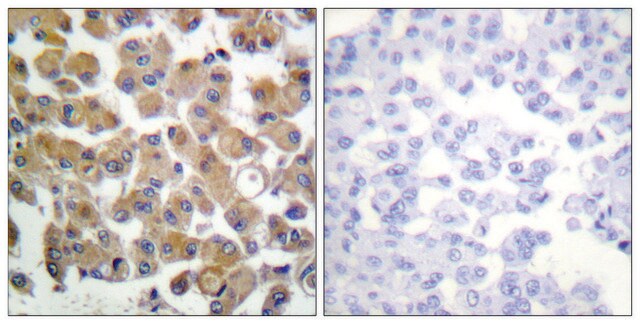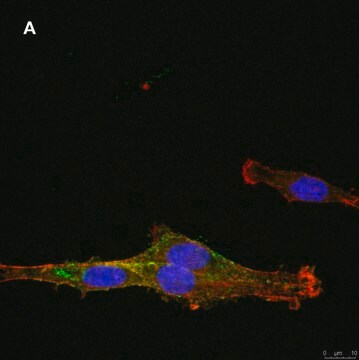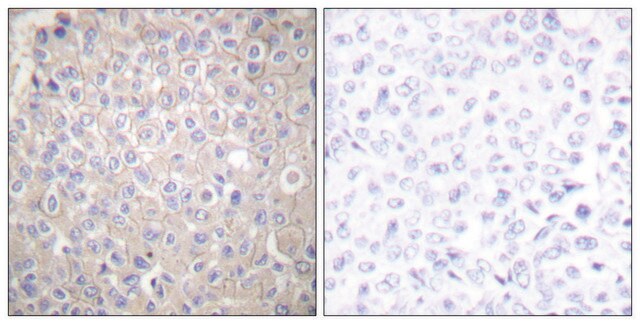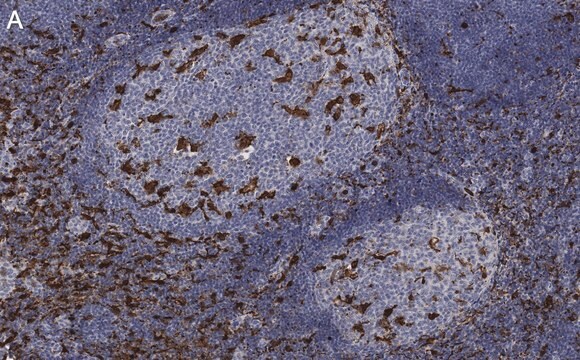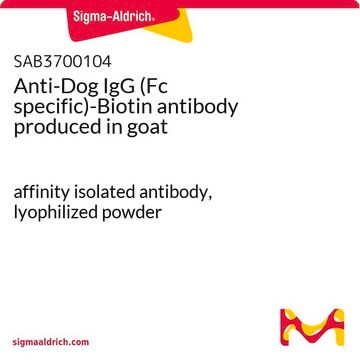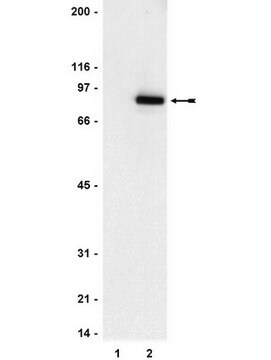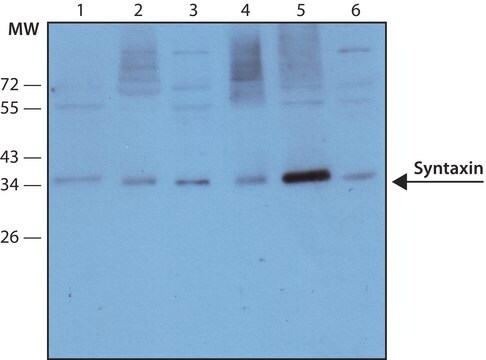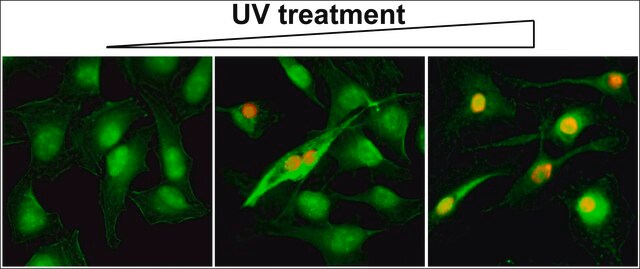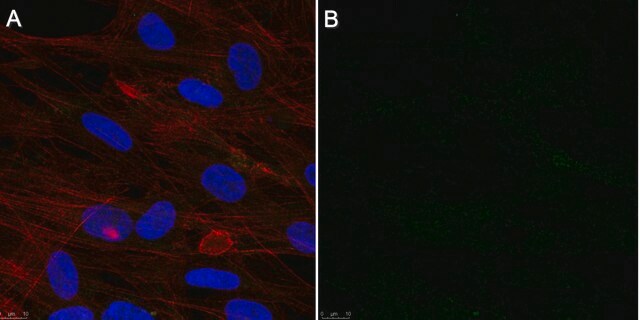일반 설명
We are committed to bringing you greener alternative products, which adhere to one or more of The 12 Principles of Green Chemistry.This antibody is Preservative-free, produced without the harm or sacrifice of animals and exceptionally stable to allow for ambient shipping and storage if needed and thus aligns with "Waste Prevention", "Designing Safer Chemicals" and "Design for Energy Efficiency".
Click here for more information.
ZooMAb® antibodies represent an entirely new generation of recombinant monoclonal antibodies.Each ZooMAb® antibody is manufactured using our proprietary recombinant expression system, purified to homogeneity, and precisely dispensed to produce robust and highly reproducible lot-to-lot consistency. Only top-performing clones are released for use by researchers. Each antibody is validated for high specificity and affinity across multiple applications, including its most commonly used application. ZooMAb® antibodies are reliably available and ready to ship when you need them.
특이성
Clone 207 is a ZooMAb® Rabbit recombinant monoclonal antibody that specifically detects MCL-1. It targets an epitope within 17 amino acids from the internal region.
면역원
KLH-conjugated linear peptide corresponding to 17 amino acids from the internal region of human MCL-1.
애플리케이션
Quality Control Testing
Evaluated by Western Blotting in Raji cell lysate.
Western Blotting Analysis: A 1:10,000 dilution of this antibody detected MCL-1 in Raji cell lysate.
Tested applications
Western Blotting Analysis: A 1:1,000 dilution from a representative lot detected human recombinant MCL-1 protein.
Immunohistochemistry (Paraffin) Analysis: A 1:100 dilution from a representative lot detected MCL-1 in human tonsil tissue sections.
Immunocytochemistry Analysis: A 1:100 dilution from a representative lot detected MCL-1 in HCT116 and K562 cells.
Affinity Binding Assay: A representative lot of this antibody bound MCL-1 Recombinant Protein with a KD of 6.8 x 10-6 in an affinity binding assay.
Note: Actual optimal working dilutions must be determined by end user as specimens, and experimental conditions may vary with the end user
표적 설명
Induced myeloid leukemia cell differentiation protein Mcl-1 (UniProt: Q07820; also known as Bcl-2-like protein 3, Bcl2-L-3, Bcl-2-related protein EAT/mcl1, mcl1/EAT) is encoded by the MCL1 (also known as BCL2L3) gene (Gene ID: 4170) in human. MCL-1 is a Bcl-2 family protein that is involved in the regulation of apoptosis. Its expression is observed in a wide variety of cell types, in the adult and during embryonic development with tissue- and differentiation-specific variations in expression levels. It promotes cell survival by interfering at an early stage of events that lead to release of cytochrome from the mitochondria. It mediates its effects by interactions with a number of other regulators of apoptosis. It contains three BH domains (BH3, 2, and 1: aa 209-223; 304-319; and 252-272, respectively). However, it lacks BH4 domain that is present in Bcl-2 and Bcl-XL. It also contains a C-terminal transmembrane domain (aa 328-348) that serves a role to localize it to mitochondrial membrane. The N-terminal region of MCL-1 contains two PEST domains that help in its rapid turnover and short half-life. Its levels are down-regulated during apoptosis. However, it can also be cleaved by caspase 3 during apoptosis at aspartic acid 127 to yield a proapoptotic 28 kDa C-terminal fragment. MCL-1 can undergo phosphorylation at threonine 163 in the PEST region and this phosphorylation induces its ubiquitination and proteasomal degradation, thereby promoting apoptosis. This ZooMAb® recombinant monoclonal antibody, generated by our propriety technology, offers significantly enhanced specificity, affinity, reproducibility, and stability over conventional monoclonals. (Ref.: Wu, X., et al. 2020). Cell Death Dis. 11(7); Article number: 556; Michels, J., et al. (2005). Int. J. Biochem. Cell Biol. 37(2); 267-271).
물리적 형태
Purified recombinant rabbit monoclonal antibody IgG, lyophilized in PBS, 5% Trehalose, normal appearance a coarse or translucent resin. The PBS/trehalose components in the ZooMAb formulation can have the appearance of a semi-solid (bead like gel) after lyophilization. This is a normal phenomenon. Please follow the recommended reconstitution procedure in the data sheet to dissolve the semi-solid, bead-like, gel-appearing material. The resulting antibody solution is completely stable and functional as proven by full functional testing. Contains no biocide or preservatives, such as azide, or any animal by-products. Larger pack sizes provided as multiples of 25 μL.
저장 및 안정성
Recommend storage of lyophilized product at 2-8°C; Before reconstitution, micro-centrifuge vials briefly to spin down material to bottom of the vial; Reconstitute each vial by adding 25 μL of filtered lab grade water or PBS; Reconstituted antibodies can be stored at 2-8°C, or -20°C for long term storage. Avoid repeated freeze-thaws.
법적 정보
ZooMAb is a registered trademark of Merck KGaA, Darmstadt, Germany
면책조항
Unless otherwise stated in our catalog or other company documentation accompanying the product(s), our products are intended for research use only and are not to be used for any other purpose, which includes but is not limited to, unauthorized commercial uses, in vitro diagnostic uses, ex vivo or in vivo therapeutic uses or any type of consumption or application to humans or animals.

